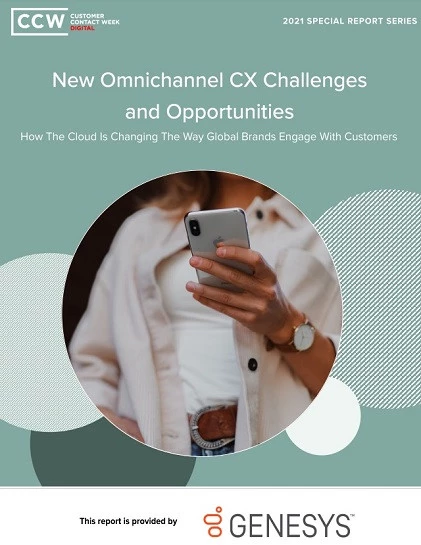The Rise Of The Mobile Customer Experience
A CCW Digital Analysis
Add bookmark
Summary: Mobile commerce is driving online sales. However, one small change can have exponential benefits for businesses.
Many customer-centric brands were quick to expand digital product offerings and services on their websites and apps during the pandemic. Many weren’t. Those who demonstrated agility in prioritizing digital customer experiences and offerings gained a competitive advantage.
As seen in a recent WSJ report, Walmart Inc., for one example, said its e-commerce revenue jumped 97% from a year ago. “The company reported in its second-quarter earnings that sales have grown due to its online supply chain and grocery business.” Walmart is even entering a new market with Walmart+, the company’s new digital subscription service set to compete with Amazon online.
Has The Pandemic Made Subscriptions The New Common Currency? Ask Walmart Or Amazon
The evolution of e-commerce has evolved rapidly during the pandemic, from greater attention to inventory management, shipping, and customer service, to new online subscription offerings.
Brands that are still discussing the importance of expanded digital product and service offerings or e-commerce focused offerings are already behind. In fact, the next big shift in consumer behavior will be a change in traditional e-commerce (shopping on a computer) to “m-commerce” (shopping on a smartphone or tablet).
From desktop to mobile
Mobile is asserting itself as the dominant digital touchpoint, which is also influencing both online sales and purchase decisions in-store. This influence will continue to deepen and it is estimated that m-commerce will double from 2019–2023, ultimately accounting for ¾ of total e-commerce sales. 
However, retailers see 45% lower conversion rates in sales on mobile devices than on desktop, as seen in a recent Deloitte report. This shows that mobile is becoming increasingly important, but the user experience is worse than online shopping on a desktop (creating opportunity for brands that are willing to invest in the mobile user experience to drive more competitive sales).
Read More: The Key To Better Business Continuity Planning? Habits
Globally, mobile is driving the consumer shift to online with shoppers spending an impressive 1.6 trillion hours on their mobile devices in 2020 – and producing growth in m-commerce that would have taken “three to four years” under normal circumstances.
(In fact, the average user spent 27% of daily waking hours, or 4.3 hours, on their mobile device in April 2020 — up 20% from 2019).
As a result, it’s estimated that mobile ad placements grew 70% during the pandemic driven by interstitial ads.
Much of the growth analysts are seeing in e-commerce is actually due to the increase in smartphone use and mobile commerce - and the factor of social networks with the power of 'influencers' and social channels, more mobile applications, in addition to other intergenerational consumer behavior changes. But one factor drives mobile sales more than any other.
Speed kills, just ask Google or Deloitte
Slow responses are the biggest problems in the eyes of consumers, whether it be customer support or general speed of service. According to our July Market Study: Modernizing Service Experiences With AI & Digital, when we asked consumers “which of these issues do you often encounter when interacting with companies?” - long wait times was the highest rated answer among 14 categories, at 56.14% of consumers. 
Anyone who’s ever abandoned a mobile site for being too slow is familiar with the negative impact of a sluggish user experience. As technology evolves, consumers get more accustomed to efficient digital channels, and they expect faster results. As consumers look to fill their needs on mobile during the current crisis, a fast experience is critical. In fact, a new study provides a much clearer view of the positive effect mobile page speed can have on performance metrics that matter to marketers, including conversion rates, average order values, and even page views.
The research, commissioned by Google and conducted by 55 and Deloitte, looked at 37 leading European and American brand sites across four verticals: retail, luxury, travel, and lead generation (for example, insurance or car dealership sites). Mobile load times were monitored hour by hour for 30 days at the end of last year, with the results consolidated in real time against a range of typical mobile purchase journey metrics.
Decreasing mobile site load times by just one tenth of a second resulted in major performance gains. Specifically, conversion rates went up by 8.4% for retail and 10.1% for travel.
The results were even more profound for the lead generation brands studied, where a mobile speed improvement of just 0.1 second for an informational page decreased bounce rate by 8.3% for 1 in 2 lead generation sites.
Businesses need to prioritize a user-first culture to see the benefits of improving site speed. Today’s users are looking to mobile, and it’s critical to be there for them with fast experiences.
Read More: The Tipping Point In Online Purchasing Decisions: What Makes Consumers Pull The Digital Trigger
This is a time when the world is vulnerable, where every person and organization is adapting to life with a live virus in their midst, where no one is operating from a best-in-class pandemic playbook to survive modern financial Darwinism. Brands, including marketers and customer experience departments must become the very people they’re trying to reach. This means that among innovation, compliance, time and technology, humanity must become the greatest application.
With over 150,000 global members, join the largest research hub for customer contact and customer experience professionals by subscribing here. Through our complementary offerings, you’ll have access to the latest research, news, blogs, podcasts, webinars, whitepapers, events, training, and technology insights in customer experience.
For media coverage, lead gen, and digital marketing inquiries, (or to say hi), contact me at matt.wujciak@customermanagementpractice.com, or connect with me on Linkedin at Matt Wujciak.


















